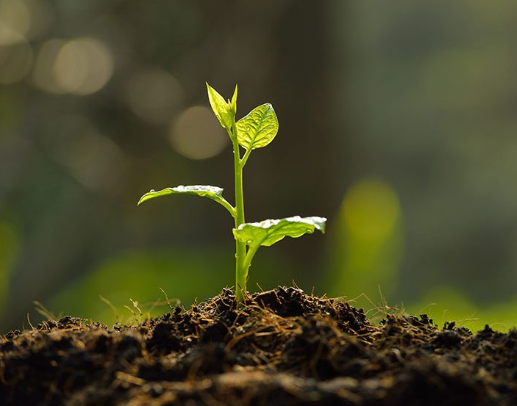Effect of Soil Temperature on Soil Properties and Plants Growth

24 May, 2022
Soil act as a major source of heat energy. Soil store energy during warm season and release it during cold season. Temperature of soil is heat exchange between soil and atmosphere. The main source of soil temperature is solar radiations. Soil temperature changes annually and daily it depends on the change in air temperature and solar radiations. Soil temperature governs physical, chemical and biological processes of soil. It also effect plant growth and rate of decomposition of organic matter and process of mineralization. Soil temperature also effect soil water retention, transmission and availability of water to plants.
Factors influencing soil temperature:
There are two main factors that influence soil temperature including:
1: The amount of heat available to the soil surface:
These factors include; soil colour, mulching, and solar radiations, slope of land surface, vegetation cover, organic matter content and evaporation.
2: Amount of heat dissipated from soil surface down to the soil profile:
These factors include; moisture content and bulk density.
Effect of soil temperature on some soil properties:
Effect of soil on biological properties:
Bioactivity:
Soil temperature ranges from 10 to 28 Celsius. Soil temperature increases the activity of extracellular enzymes and degrades organic matter in soil and increase microbial respiration. When temperature of soil increases it also increases the rate of nitrogen mineralization by increasing microbial activity and decomposition of soil organic matter. When soil temperature decreases below the freezing point it can decrease the process of mineralization by inhibiting microbial activity.

Soil microorganism:
Soil microbial activity is decreased with low soil temperature soil microorganisms requires temperature between 10 to 35.6 Celsius for their activity.
Soil macro-organisms:
At a soil temperature between 10 to 24 Celsius soil macro-organisms have higher metabolism rate but at extreme high temperature e.g. 58 Celsius soil macro-organisms dies due to unfavourable temperature. Soil macro-organisms do not survive at temperature below freezing point.
Organic matter decomposition:
Soil organic matter start accumulating in soil at temperature below 0 Celsius due to low rate of decomposition. Decomposition of organic matter increases at the temperature between 2 to 38 Celsius through stimulation of microbial activity and increase in movement of soluble substrates in soil.
Effect of soil chemical properties:
Cation exchange capacity:
Increase in soil temperature results in decrease in cation exchange capacity of soil. Reduction in organic matter and clay size as a result of high temperature leads towards decrease in cation exchange capacity of soil.
Available phosphorus:
The concentration of water soluble phosphorus is increased at soil temperature 50 to 250 Celsius due to increased movement of phosphorus in soil through diffusion. At low temperature concentration of phosphorus in soil is decreased due to hindrance in release of phosphorus from organic matter.
Soil PH:
PH of the soil is increases at the temperature between 25 to 39 Celsius due to denaturation of organic acid at high temperature.

Effect of soil physical properties:
Soil structure:
Increase in soil temperature causes dehydration in clay particles which in turn develop strong interaction between clay particles and yields in less clay and more silt sized particles. High temperature also causes cracking of sand particles and also reduced the sand sized particles in soil. Increase in soil temperature lessens the clay and sand particles and increase the silt particles in soil.
Aggregate stability:
Aggregate stability is a transformation of iron and aluminium oxides which in turn act as the strengthening agents of clay particles then form strong silt particles. At soil temperature of 30 Celsius the aggregate stability of soil increases.
Soil moisture content:
Increase in soil temperature results decrease in soil moisture content and also decrease water viscosity. Reduction in shade and increase in soil temperature results in high evaporation rate from soil surface which in turn reduced the movement of water in soil profile.

Soil aeration:
High temperature increase micro-organisms activity in soil which results in higher production of carbon dioxide in soil. Temperature also influences carbon dioxide concentration in soil air.
Effects of soil temperature on plant growth:
Soil temperature has great influence on plants growth by affecting water and nutrients uptake and also by affecting growth of root and shoots.
Water uptake:
Low soil temperature decreases the uptake of water and also decreases the rate of water absorption by plants. Decrease water uptake results in reduction in rate of photosynthesis.
Nutrient uptake:
Increase in soil temperature increases the metabolic activities in soil which in turn stimulate the availability of nutrients for plants. At low soil temperature nutrients uptake by plants is reduced due to high soil water viscosity and low activity of root nutrients transport.

Root growth:
Increase in soil temperature causes increase in root growth by increasing metabolic activity of root cells. Low temperature results decrease in root growth due to reduced tissue nutrient concentration.
Conclusion:
Soil is essential for maintenance of plant life, providing mechanical support, supplying nutrients, and water. Soil is a major source of heat and soil temperature controls many biological processes. Soil temperature influences soil moisture, soil aeration, and it also influences plants growth by providing nutrients to plants necessary for their growth.




Due to climate changes alot of problems faces a crops and all the plants even my personally experience my aloe vera plant 🌵 is dead for the reason of highly heated..